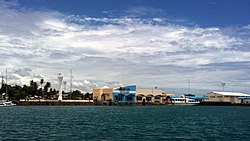San Carlos | |
|---|---|
| City of San Carlos | |
 Port of San Carlos | |
| Motto(s): "¡Vamos, San Carlos!" | |
| Anthem: "Mutyang Dakbayan" | |
 Map of Negros Occidental with San Carlos highlighted | |
Location within the Philippines | |
| Coordinates: 10°29′35″N 123°24′34″E / 10.492936°N 123.409456°E | |
| Country | Philippines |
| Region | Negros Island Region |
| Province | Negros Occidental |
| District | 1st district |
| Founded | 1898 |
| Cityhood | July 1, 1960 |
| Named for | St. Charles Borromeo |
| Barangays | 18 (see Barangays) |
| Government | |
| • Type | Sangguniang Panlungsod |
| • Mayor | Renato Y. Gustilo |
| • Vice Mayor | Christopher Paul S. Carmona |
| • Representative | Gerardo P. Valmayor Jr. |
| • City Council | Members |
| • Electorate | 85,878 voters (2022) |
| Area | |
• Total | 451.50 km2 (174.33 sq mi) |
| Elevation | 456 m (1,496 ft) |
| Highest elevation | 2,427 m (7,963 ft) |
| Lowest elevation | 0 m (0 ft) |
| Population (2020 census)[3] | |
• Total | 132,650 |
| • Density | 290/km2 (760/sq mi) |
| • Households | 33,623 |
| Demonym(s) | San Carloseño (masculine) San Carloseña (feminine) |
| Economy | |
| • Income class | 2nd city income class |
| • Poverty incidence | 29.75 |
| • Revenue | ₱ 1,283 million (2020), 579 million (2012), 627.3 million (2013), 672.5 million (2014), 819.2 million (2015), 863 million (2016), 957 million (2017), 1,105 million (2018), 1,210 million (2019), 1,719 million (2021), 2,148 million (2022) |
| • Assets | ₱ 4,079 million (2020), 1,134 million (2012), 1,186 million (2013), 1,205 million (2014), 1,790 million (2015), 2,374 million (2016), 2,738 million (2017), 3,243 million (2018), 3,653 million (2019), 4,412 million (2021), 4,915 million (2022) |
| • Expenditure | ₱ 1,127 million (2020), 462.5 million (2012), 495.4 million (2013), 518.8 million (2014), 535.9 million (2015), 547.9 million (2016), 621.2 million (2017), 680.9 million (2018), 819.6 million (2019), 1,415 million (2021), 1,628 million (2022) |
| • Liabilities | ₱ 786.6 million (2020), 283.6 million (2012), 319.4 million (2013), 322.4 million (2014), 464.7 million (2015), 483.3 million (2016), 528 million (2017), 628.9 million (2018), 701.9 million (2019), 837.6 million (2021), 849.6 million (2022) |
| Service provider | |
| • Electricity | Northern Negros Electric Cooperative (NONECO) |
| Time zone | UTC+8 (PST) |
| ZIP code | 6127 |
| PSGC | |
| IDD : area code | +63 (0)34 |
| Native languages | Hiligaynon Cebuano Tagalog |
| Website | www |
San Carlos, officially the City of San Carlos (Cebuano: Dakbayan sa San Carlos; Hiligaynon: Dakbanwa/Syudad sang San Carlos; Filipino: Lungsod ng San Carlos), is a second-class component city in the province of Negros Occidental in the Philippines. According to the 2020 census, it has a population of 132,650 people.[3]
The municipality's status was elevated to city on July 1, 1960, per Republic Act No. 2643[5] and Presidential Proclamation No. 685 s. 1960.[6]
- ^ City of San Carlos | (DILG)
- ^ "2015 Census of Population, Report No. 3 – Population, Land Area, and Population Density" (PDF). Philippine Statistics Authority. Quezon City, Philippines. August 2016. ISSN 0117-1453. Archived (PDF) from the original on May 25, 2021. Retrieved July 16, 2021.
- ^ a b Census of Population (2020). "Region VI (Western Visayas)". Total Population by Province, City, Municipality and Barangay. Philippine Statistics Authority. Retrieved July 8, 2021.
- ^ "PSA Releases the 2021 City and Municipal Level Poverty Estimates". Philippine Statistics Authority. April 2, 2024. Retrieved April 28, 2024.
- ^ "Republic Act No. 2643 – An Act Creating the City of San Carlos". The LawPhil Project. Arellano Law Foundation. June 18, 1960. Retrieved November 6, 2019.
- ^ "Proclamation No. 685, s. 1960 – Declaring July 1, 1960, as The Date for The Formal Organization of The City of San Carlos". Official Gazette of the Republic of the Philippines. Republic of the Philippines. June 29, 1960. Retrieved November 6, 2019.



